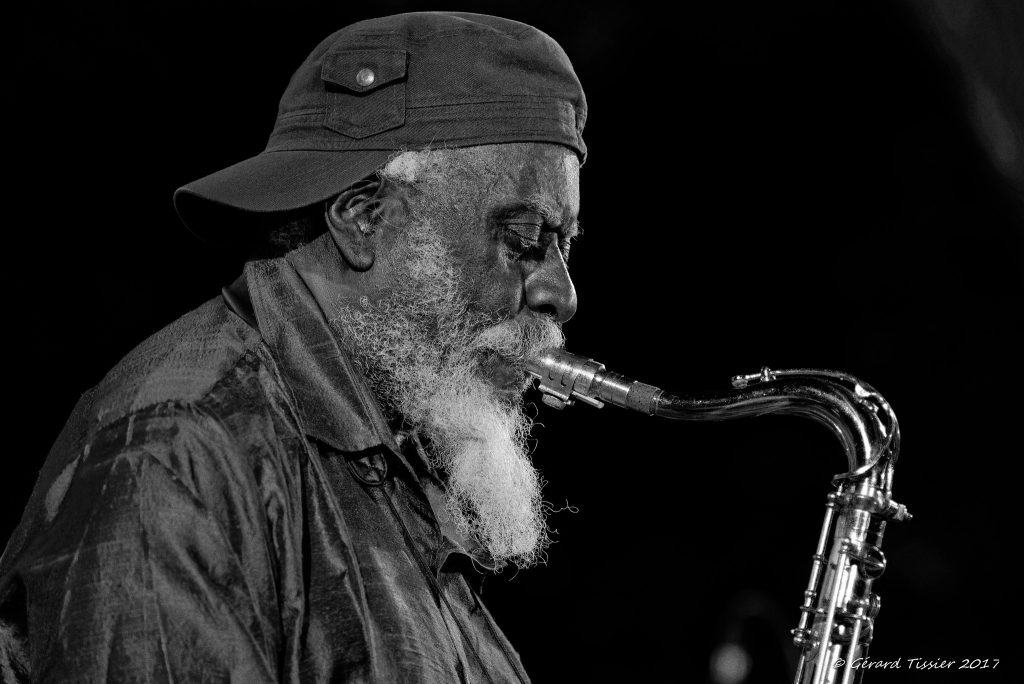Five Songs That Exemplify the Musical Legacy of Pharoah Sanders
Pharoah Sanders, who turned 80 this year, is a jazz pioneer who’s spiritual artistic improvisations have changed the trajectory of jazz saxophone.

Over the course of his iconic career, Pharoah Sanders has shaped his own unique path and woven sonic tapestries comprised of deep, spiritual artistic improvisations that have changed the way we viewed jazz saxophone.
Born Ferrell Sanders, in Little Rock, Arkansas, Sanders moved out of the Jim Crow south to Oakland, California, where he met and befriended John Coltrane and began his enduring musical journey.
Click on the player above to hear “5 on 5: Pharoah Sanders” and get a feel for Sanders’ iconic career with these five essential tracks:
The Progressive Underground’s 5 on 5: Pharoah Sanders
1.“ Selflessness” — John Coltrane feat. Pharoah Sanders
After gigging on the west coast, Sanders relocated to New York City and became aligned with and mentored by Coltrane, recording with him on some of his late-career exploratory albums including “Ascension,” “Meditations,” and “Kulu Sé Mama,” on which Sanders would often play a dueling saxophone role with Coltrane.
Sanders would appear on nine of Coltrane’s legendary “Impulse!” releases from 1965 to 1967 and would later sign to Impulse, which put out his first release, 1966’s “Tauhid.”
The record signaled an artist who would have an immediate and lasting impact on the jazz scene and put him in conversation with his mentor and other like-minded musicians including Ornette Coleman, Albert Ayler and Archie Shepp.
2. “Upper Egypt & Lower Egypt” – Pharoah Sanders
As exemplified in “Upper Egypt & Lower Egypt,” Sander’s use of rhythm and its interplay with the celestial sounds of his saxophone made him a prime mover in the jazz community. The track was later sampled by iconic Detroit-based hip hop beatmaker J Dilla for his “King of Beats” project.
3.“The Creator Has a Master Plan” – Pharoah Sanders
Upon the death of his mentor John Coltrane, Sanders remained with Impulse Records and was seen as the logical successor to his sound. Although Sanders was influenced by Coltrane, his sound would prove to be quite different.
Sanders often incorporated spiritual elements such as chanting in Om, employ poly-rhythmic African percussion, incorporate gospel-style vocals atop melodic, free jazz in tandem with his improvisational sax sound, which can be heard in “The Creator Has A Master Plan,” from his 1969 album release “Karma.”
4. “Thembi” – Pharoah Sanders
In the early 1970s, Sanders’ music began to adopt a transcendent feel as he became known as one of the purveyors of spiritual and cosmic jazz stylings.
Continuing to reinforce his pathway in spiritual/cosmic-style jazz, Sanders would release one of the most potent albums in his discography, the 1971 project titled “Thembi.” On this album, he moved away from long, intense compositions and into shorter, punchier tracks. He also got into playing a large variety of instruments including tenor, alto, and soprano saxophone, the bailophone (African thumb piano), small percussion instruments, and a cow horn.
5. “Astral Traveling” – Pharoah Sanders
Throughout the mid-70s, 80s and 90s, Sanders would diversify his sound incorporating modal and hard bop while venturing into rhythm and blues. He won a Grammy Award (along with McCoy Tyner, Roy Haynes, Cecil McBee and David Murray) for the album “Blues for Coltrane: A Tribute to John Coltrane.”
Sanders’ legacy is two-fold: He was John Coltrane’s preeminent disciple who employed the sonic template that Coltrane had forged earlier in free jazz and but he evolved the sound into spiritually-layered cosmically textured jazz, a high-water mark for the genre.
His is a sound that has permeated a new generation of jazz musicians such as Kamasi Washington and others with similar musical and spiritual-infused inclinations.
Sanders who turned 80 this year, was one of the headlining acts at this year’s Detroit Jazz Fest.
Trusted, accurate, up-to-date
WDET is here to keep you informed on essential information, news and resources related to COVID-19.
This is a stressful, insecure time for many. So it’s more important than ever for you, our listeners and readers, who are able to donate to keep supporting WDET’s mission. Please make a gift today.
